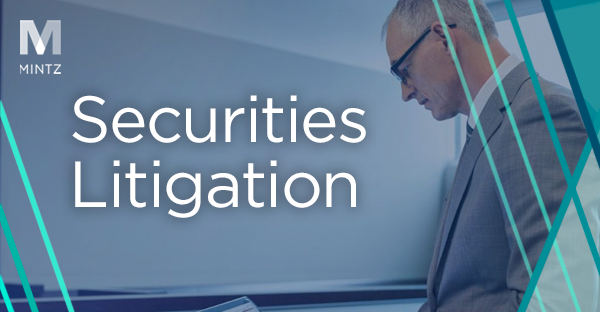
Institutional Investor Class Action Recovery
Filter by:
The Last Remaining FX Defendant Prevails at Trial
April 5, 2023 | Blog | By Elizabeth M. Platonova, Joel Rothman
Class Plaintiffs in the case of In re Foreign Exchange Benchmark Rates AntiTrust Litigation alleged that Defendant banks conspired to fix prices in the foreign exchange (“FX”) market in violation of Sections 1 and 3 of the Sherman Antitrust Act. All but one of the Defendant banks settled several years ago for a total of $2.3 billion. Defendant Credit Suisse decided to proceed to trial, and on October 20, 2022, a Manhattan federal jury found that Credit Suisse played no part in a conspiracy to fix the foreign currency exchange market.
Recent First Circuit Opinion in SEC v. Lemelson Provides a Roadmap for Section 10(b) Cases Involving an Opinion Defense
January 20, 2023 | Blog | By Joel Rothman, Elizabeth M. Platonova
On January 3, 2023, the First Circuit released an opinion that provides a straightforward analysis of the legal standards for determining if statements are non-actionable opinions, as well as the viability of materiality and scienter defenses.
“We lost. Sorry everyone”: The Implications of a District Court Finding Digital Token, LBC, Is a Security
November 21, 2022 | Blog | By Ellen Shapiro, Will G. McKitterick, Sofia Nuño
Crypto litigation, fueled by a surge of investors and market volatility, has ballooned in recent years. For example, numerous securities class actions and government subpoenas followed the May 2022 collapse of the $60 billion Terra network, along with stablecoin TerraUSD and the LUNA token.
Court Finds Proposed Opt Out Provisions to Be Too Burdensome
October 13, 2021 | Blog | By Joel Rothman, Sofia Nuño
Second Circuit Revives Antitrust Class Action Brought by Two Non-Existent Entities
April 5, 2021 | Blog | By Aaron Fenton
Two Isn’t Always Better Than One: SDNY Denies Class Certification Where Lead Plaintiff Hired Two Firms
October 21, 2020 | Blog | By Ellen Shapiro
How a Prior DOJ Settlement Doomed a SEC Enforcement Action: A Volkswagen Case Study
September 10, 2020 | Blog | By Ellen Shapiro
Ninth Circuit to Determine Whether Direct Listing Purchasers Have Standing Under Sections 11 and 12 of 1933 Act
August 25, 2020 | Blog | By Alain Mathieu, Joel Rothman
When A Relationship Is Insufficient: Opting Out of the FX Antitrust Class Action Requires Clear Indication
July 9, 2020 | Blog | By Ellen Shapiro
Federal Court Denies Toshiba’s Motion to Dismiss, Allowing Exchange Act Claims Covering Transactions in Unsponsored ADS to Proceed Alongside Japanese Law Claims Covering Common Shares
February 19, 2020 | Blog | By Joel Rothman
Second Circuit Summarily Affirms the Attorneys’ Fees Award in the Foreign Exchange Antitrust Settlement after District Court Rejects Class Counsel’s Side Deal with the Objector
December 2, 2019 | Blog | By Joel Rothman
Connecticut Court Says Intervention Is One Way To Preserve Putative Class Member's Right To Opt Out
October 10, 2019 | Blog | By Ellen Shapiro
Judge Rakoff Unseals Documents in Petrobras Securities Class Action To Allow Use in Foreign Arbitration, Bypassing Traditional Requirements of 28 U.S.C. § 1782
August 14, 2019 | Blog | By Ellen Shapiro
Supreme Court Denies Opportunity To Clarify Whether The Federal Securities Laws Carry a Duty to Update
May 22, 2019 | Blog | By Ellen Shapiro
Tenth Circuit Affirms Extraterritorial Reach of SEC Enforcement of the Federal Securities Laws
April 25, 2019 | Blog | By Alain Mathieu, Joel Rothman
Teva Putative Federal Securities Class Member Seeks to Toll Statute of Repose with Motion to Intervene
March 12, 2019 | Blog | By Kevin Mortimer, Ellen Shapiro
Petition for Certiorari Asks Supreme Court to Clarify Whether the Federal Securities Laws Carry a Duty to Update
February 14, 2019 | Blog | By Ellen Shapiro
Explore Other Viewpoints:
- Data Centers & Digital Infrastructure
- AI: The Washington Report
- Antitrust and Federal Regulation
- Appellate
- Arbitration, Mediation & Alternate Dispute Resolution
- Artificial Intelligence
- Awards
- Bankruptcy & Restructuring
- California Land Use
- Cannabis
- Class Action
- Complex Commercial Litigation
- Construction
- Consumer Product Safety
- Corporate Governance (ESG)
- Cross-Border Asset Recovery
- DEI Legal Developments
- Debt Financing
- Direct Investing (M&A)
- Diversity
- EB-5 Financing
- Education & Nonprofits
- Employment
- EnforceMintz
- Environmental (ESG)
- Environmental Enforcement Defense
- Environmental Law
- Environmental, Social, and Corporate Governance (ESG)
- FDA Regulatory
- False Claims Act
- Federal Circuit Appeals
- Financial Institution Litigation
- Government Law
- Growth Equity
- Health Care
- Health Care Compliance, Fraud and Abuse, & Regulatory Counseling
- Health Care Enforcement & Investigations
- Health Care Transactions
- Health Information Privacy & Security
- IP Due Diligence
- IPRs & Other Post Grant Proceedings
- Immigration
- Impacts of a New US Administration
- Insolvency & Creditor Rights Litigation
- Institutional Investor Class Action Recovery
- Insurance & Financial Services
- Insurance Consulting & Risk Management
- Insurance and Reinsurance Problem-Solving & Dispute Resolution
- Intellectual Property
- Investment Funds
- Israel
- Licensing & Technology Transactions
- Life Sciences
- Litigation & Investigations
- M&A Litigation
- ML Strategies
- Managed Care
- Medicare, Medicaid and Commercial Coverage & Reimbursement
- Mergers & Acquisitions
- Patent Litigation
- Patent Prosecution & Strategic Counseling
- Pharmacy Benefits and PBM Contracting
- Portfolio Companies
- Privacy & Cybersecurity
- Private Client
- Private Equity
- Pro Bono
- Probate & Fiduciary Litigation
- Products Liability & Complex Tort
- Projects & Infrastructure
- Public Finance
- Real Estate Litigation
- Real Estate Transactions
- Real Estate, Construction & Infrastructure
- Retail & Consumer Products
- Securities & Capital Markets
- Securities Litigation
- Social (ESG)
- Special Purpose Acquisition Company (SPACs)
- Sports & Entertainment
- State Attorneys General
- Strategic IP Monetization & Licensing
- Sustainable Energy & Infrastructure
- Tax
- Technology
- Technology, Communications & Media
- Technology, Communications & Media Litigation
- Trade Secrets
- Trademark & Copyright
- Trademark Litigation
- Unified Patent Court (UPC)
- Value-Based Care
- Venture Capital & Emerging Companies
- White Collar Defense & Government Investigations
- Women's Health and Technology



